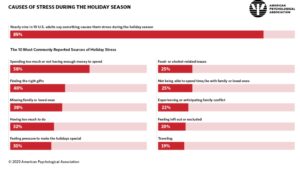The holiday season has arrived, and with it comes a little extra bonus package: holiday anxiety. “Holiday anxiety is a very specific type of stress,” according to Marie Ouellette, LICSW, Chief Clinical Officer at Marblehead Counseling Center, who notes that the very holiday traditions and celebrations meant to bring us joy can also lead to enormous pressure. “The figures are staggering, with nearly 90% of adults saying they feel stress during the holiday season.”
While the holidays are a time of joy to many, Ouellette noted that it’s important to be aware that they can also cause emotional overload, physical symptoms, substance abuse issues, and social stress.
“The season can exacerbate our feelings of isolation or loneliness, and of not living up to our own or others’ expectations,” she said. “Even the simple fact that our routines are disrupted can be difficult.”
Money, money, money
According to a 2023 American Psychological Association survey, the most common form of holiday anxiety centers on money, either spending too much or not having enough to spend. Things aren’t letting up, either — the APA, which has surveyed Americans for the past four years about holiday stress, found that one-quarter of Americans say they’re more stressed this year than last. The barrage of holiday advertising showing mounds of food, presents under trees, and happy, laughing families doesn’t help — gift giving, missing loved ones, having too much to do, and feeling too much pressure to make the holidays extraordinary also make the “high anxiety” list.
Holiday travel is always a stressor, and this year, fallout from the government shutdown and ongoing flight cancellations is causing strain for many planning to take to the skies to see family and friends. Last year, TSA reported that the Sunday after Thanksgiving saw a record-breaking 3.09 million passengers screened. The shutdown has already caused the cancellation of thousands of flights and affected millions of travelers, with airline executives and the Federal Aviation Administration warning that it will take time to reconfigure planes, crews, and schedules, even after the government shutdown has ended.
Vulnerable populations
Vulnerable populations, particularly those already struggling with mental health issues, are at increased risk for holiday stress and depression. According to the National Alliance on Mental Illness, 64% of individuals living with a mental illness report their conditions worsen around the holidays.
Some groups experience added holiday strain due to other factors. For young members of the LGBQT+ community, for instance, holidays can be extremely stressful, often including a lack of acceptance by family members, religious tensions, a sense of not belonging and having to cope with either being “out” — or not.
More than two million Americans aged 65 and older suffer from depression, according to the Centers for Disease Control and Prevention, often identified as late-life depression (LLD). But elder care workers say many seniors without diagnosed depression find the holidays difficult due to their changing life circumstances: loss of loved ones, changes in finances and living situations, and a decline in overall health. According to the Department of Veterans Affairs, the holidays can also be a real struggle for vets, heightening symptoms of post-traumatic stress disorder and generalized anxiety disorder, placing a focus on painful dates or anniversaries, and inducing survivor’s guilt.
And then there’s the simple fact that a growing number of Americans find it difficult to stay connected in an increasingly fragmented world. In a 2025 APA survey, half or more of U.S. adults report these signs of loneliness: feelings of isolation or lack of companionship and of being left out, all of which can play a significant part in our experience of holiday anxiety.
Coping strategies
There are things that can help make it better, according to Ouellette, but much of it is about adjusting our attitudes and taking a healthier approach to holiday expectations.
“Identify your stressors and try to let go of old traditions that don’t work anymore, or, for whatever reasons, don’t work this particular year. People change, economic circumstances change, families change. Why can’t our holiday traditions change, too?” Ouellette said.
It’s OK to ask for help, from friends and family, as well as professionals. Ouellette said Marblehead Counseling Center is just one local resource for counseling, and it has open daytime slots for those feeling anxiety and depression this season.
It’s OK, too, Ouellette said, to just say no to what we’ve “always” done, to what is causing the stress.
“We have these images in our heads — put there by movies and TV shows and advertisers — that tell us what a holiday ‘should’ be. You really can have a fabulous Thanksgiving eating a pizza, sharing it with the people you care about. The best way to feel less stressed is to cut ourselves some slack,” Ouellette said.
Resources: Marblehead Counseling Center https://www.marbleheadcounseling.org/
Anxiety tips by the Anxiety and Depression Association of America https://adaa.org/learn-from-us/from-the-experts/blog-posts/consumer/find-your-holiday-happiness
Mass Behavioral Health Hotline
https://www.masshelpline.com/ In English, Spanish, French, Chinese, Arabic, German, Italian
If you or someone you know is struggling or in crisis, help is available. Call or text 988 or chat 988lifeline.org to reach the 988 Suicide & Crisis Lifeline.
10 Stress-busting Tips
- Identify your specific holiday worries and concerns, and make a plan beforehand for what to do if things go awry.
- Take the pressure off yourself. The perfect is the enemy of the good – do what you can, and if you can’t, let it go, or assign the task to someone else.
- Smile, make eye contact, and engage. If you’re stressed talking about yourself, ask questions. Avoid touchy subjects, like politics or religion.
- Don’t look for relief in alcohol or drugs. They often trigger more anxiety and panic attacks.
- Eat well. The central nervous system releases adrenaline and cortisol when confronted with a stressor, which affects the digestive tract. Acute stress can kill the appetite — but the release of cortisol can also cause fat and sugar cravings.
- Practice self care. Take a walk, read a book, do some yoga. Exercise is a great stress reliever. Ask someone to join you. Being active together can be a great way to reconnect.
- Plan and confirm all details ahead of time, especially regarding travel. Allow ample time at airports, choose travel times when crowds are smaller. AAA suggests downloading your airline’s mobile app in case your flight is cancelled.
- Prepare for what you will do if you are overwhelmed or your emotions get derailed. Download a meditation tape, book, movie, podcast or music to help you de-stress in the event of a delay or a rocky situation. Pack a few light snacks or gum — chewing helps alleviate stress.
- Help someone out. According to APA, helping others reduces everyday stress.
- Get your rest. Sleep allows your mind, body — and emotions — to reset.


